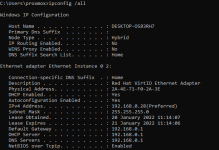Code:
root@proxmox:~# tcpdump -envi eth0 icmp
tcpdump: listening on eth0, link-type EN10MB (Ethernet), snapshot length 262144 bytes
09:33:44.556904 00:15:5d:38:01:0b > b0:a7:b9:22:3a:94, ethertype IPv4 (0x0800), length 120: (tos 0xc0, ttl 64, id 4814, offset 0, flags [none], proto ICMP (1), length 106)
192.168.0.14 > 192.168.0.251: ICMP 192.168.0.14 udp port 137 unreachable, length 86
(tos 0x0, ttl 64, id 47033, offset 0, flags [DF], proto UDP (17), length 78)
192.168.0.251.56278 > 192.168.0.14.137: UDP, length 50
09:33:44.568673 00:15:5d:38:01:0b > b0:a7:b9:22:3a:94, ethertype IPv4 (0x0800), length 120: (tos 0xc0, ttl 64, id 4816, offset 0, flags [none], proto ICMP (1), length 106)
192.168.0.14 > 192.168.0.251: ICMP 192.168.0.14 udp port 137 unreachable, length 86
(tos 0x0, ttl 64, id 47044, offset 0, flags [DF], proto UDP (17), length 78)
192.168.0.251.60581 > 192.168.0.14.137: UDP, length 50
09:33:58.959657 ce:ec:23:71:85:72 > c0:3e:0f:30:53:8c, ethertype IPv4 (0x0800), length 98: (tos 0x0, ttl 64, id 12026, offset 0, flags [DF], proto ICMP (1), length 84)
192.168.0.231 > 192.168.0.1: ICMP echo request, id 444, seq 1, length 64
09:33:59.980962 ce:ec:23:71:85:72 > c0:3e:0f:30:53:8c, ethertype IPv4 (0x0800), length 98: (tos 0x0, ttl 64, id 12227, offset 0, flags [DF], proto ICMP (1), length 84)
192.168.0.231 > 192.168.0.1: ICMP echo request, id 444, seq 2, length 64
09:34:01.004926 ce:ec:23:71:85:72 > c0:3e:0f:30:53:8c, ethertype IPv4 (0x0800), length 98: (tos 0x0, ttl 64, id 12267, offset 0, flags [DF], proto ICMP (1), length 84)
192.168.0.231 > 192.168.0.1: ICMP echo request, id 444, seq 3, length 64
09:34:02.029111 ce:ec:23:71:85:72 > c0:3e:0f:30:53:8c, ethertype IPv4 (0x0800), length 98: (tos 0x0, ttl 64, id 12456, offset 0, flags [DF], proto ICMP (1), length 84)
192.168.0.231 > 192.168.0.1: ICMP echo request, id 444, seq 4, length 64
09:34:03.052894 ce:ec:23:71:85:72 > c0:3e:0f:30:53:8c, ethertype IPv4 (0x0800), length 98: (tos 0x0, ttl 64, id 12465, offset 0, flags [DF], proto ICMP (1), length 84)
192.168.0.231 > 192.168.0.1: ICMP echo request, id 444, seq 5, length 64
09:34:04.076939 ce:ec:23:71:85:72 > c0:3e:0f:30:53:8c, ethertype IPv4 (0x0800), length 98: (tos 0x0, ttl 64, id 12468, offset 0, flags [DF], proto ICMP (1), length 84)
192.168.0.231 > 192.168.0.1: ICMP echo request, id 444, seq 6, length 64
09:34:05.483105 00:15:5d:38:01:0b > b0:a7:b9:22:3a:94, ethertype IPv4 (0x0800), length 120: (tos 0xc0, ttl 64, id 7530, offset 0, flags [none], proto ICMP (1), length 106)
192.168.0.14 > 192.168.0.251: ICMP 192.168.0.14 udp port 137 unreachable, length 86
(tos 0x0, ttl 64, id 57424, offset 0, flags [DF], proto UDP (17), length 78)
192.168.0.251.34033 > 192.168.0.14.137: UDP, length 50
09:34:05.493791 00:15:5d:38:01:0b > b0:a7:b9:22:3a:94, ethertype IPv4 (0x0800), length 120: (tos 0xc0, ttl 64, id 7531, offset 0, flags [none], proto ICMP (1), length 106)
192.168.0.14 > 192.168.0.251: ICMP 192.168.0.14 udp port 137 unreachable, length 86
(tos 0x0, ttl 64, id 57434, offset 0, flags [DF], proto UDP (17), length 78)
192.168.0.251.37248 > 192.168.0.14.137: UDP, length 50
09:34:26.400395 00:15:5d:38:01:0b > b0:a7:b9:22:3a:94, ethertype IPv4 (0x0800), length 120: (tos 0xc0, ttl 64, id 12049, offset 0, flags [none], proto ICMP (1), length 106)
192.168.0.14 > 192.168.0.251: ICMP 192.168.0.14 udp port 137 unreachable, length 86
(tos 0x0, ttl 64, id 58708, offset 0, flags [DF], proto UDP (17), length 78)
192.168.0.251.50067 > 192.168.0.14.137: UDP, length 50
09:34:26.411171 00:15:5d:38:01:0b > b0:a7:b9:22:3a:94, ethertype IPv4 (0x0800), length 120: (tos 0xc0, ttl 64, id 12052, offset 0, flags [none], proto ICMP (1), length 106)
192.168.0.14 > 192.168.0.251: ICMP 192.168.0.14 udp port 137 unreachable, length 86
(tos 0x0, ttl 64, id 58709, offset 0, flags [DF], proto UDP (17), length 78)
192.168.0.251.36584 > 192.168.0.14.137: UDP, length 50
09:34:27.232990 00:15:5d:38:01:0b > a4:bb:6d:e4:e0:61, ethertype IPv4 (0x0800), length 120: (tos 0xc0, ttl 64, id 27248, offset 0, flags [none], proto ICMP (1), length 106)
192.168.0.14 > 192.168.0.100: ICMP 192.168.0.14 udp port 137 unreachable, length 86
(tos 0x0, ttl 128, id 42889, offset 0, flags [none], proto UDP (17), length 78)
192.168.0.100.63204 > 192.168.0.14.137: UDP, length 50
09:34:27.233092 00:15:5d:38:01:0b > a4:bb:6d:e4:e0:61, ethertype IPv4 (0x0800), length 183: (tos 0xc0, ttl 64, id 27249, offset 0, flags [none], proto ICMP (1), length 169)
192.168.0.14 > 192.168.0.100: ICMP 192.168.0.14 udp port 161 unreachable, length 149
(tos 0x0, ttl 128, id 42890, offset 0, flags [none], proto UDP (17), length 141)
192.168.0.100.63205 > 192.168.0.14.161: { SNMPv1 { GetRequest(98) R=813225977 .1.3.6.1.2.1.1.1.0 .1.3.6.1.2.1.1.2.0 .1.3.6.1.2.1.1.4.0 .1.3.6.1.2.1.1.5.0 .1.3.6.1.2.1.1.6.0 .1.3.6.1.2.1.1.7.0 } }I pinged 192.168.0.14 from the container, then 192.168.0.1 from the container.
Code:
root@proxmox-container:~# ping 192.168.0.14
PING 192.168.0.14 (192.168.0.14) 56(84) bytes of data.
64 bytes from 192.168.0.14: icmp_seq=1 ttl=64 time=0.021 ms
64 bytes from 192.168.0.14: icmp_seq=2 ttl=64 time=0.030 ms
64 bytes from 192.168.0.14: icmp_seq=3 ttl=64 time=0.028 ms
64 bytes from 192.168.0.14: icmp_seq=4 ttl=64 time=0.025 ms
64 bytes from 192.168.0.14: icmp_seq=5 ttl=64 time=0.030 ms
^C
--- 192.168.0.14 ping statistics ---
5 packets transmitted, 5 received, 0% packet loss, time 4078ms
rtt min/avg/max/mdev = 0.021/0.026/0.030/0.003 ms
root@proxmox-container:~# ping 192.168.0.1
PING 192.168.0.1 (192.168.0.1) 56(84) bytes of data.
^C
--- 192.168.0.1 ping statistics ---
6 packets transmitted, 0 received, 100% packet loss, time 5117ms
root@proxmox-container:~#Finally, just to check we haven't lost our marbles a sanity check to check that proxmox itself is still able to see the gateway:
Code:
root@proxmox:~# ping 192.168.0.1
PING 192.168.0.1 (192.168.0.1) 56(84) bytes of data.
64 bytes from 192.168.0.1: icmp_seq=1 ttl=64 time=1.13 ms
64 bytes from 192.168.0.1: icmp_seq=2 ttl=64 time=0.625 ms
64 bytes from 192.168.0.1: icmp_seq=3 ttl=64 time=0.821 ms
64 bytes from 192.168.0.1: icmp_seq=4 ttl=64 time=0.746 ms
^C
--- 192.168.0.1 ping statistics ---
4 packets transmitted, 4 received, 0% packet loss, time 3029ms
rtt min/avg/max/mdev = 0.625/0.830/1.129/0.186 msAlso trying something else on the network:
Code:
root@proxmox:~# ping 192.168.0.99
PING 192.168.0.99 (192.168.0.99) 56(84) bytes of data.
64 bytes from 192.168.0.99: icmp_seq=1 ttl=64 time=0.338 ms
64 bytes from 192.168.0.99: icmp_seq=2 ttl=64 time=0.380 ms
64 bytes from 192.168.0.99: icmp_seq=3 ttl=64 time=0.344 ms
64 bytes from 192.168.0.99: icmp_seq=4 ttl=64 time=0.381 ms
^C
--- 192.168.0.99 ping statistics ---
4 packets transmitted, 4 received, 0% packet loss, time 3079ms
rtt min/avg/max/mdev = 0.338/0.360/0.381/0.019 ms
Last edited:



